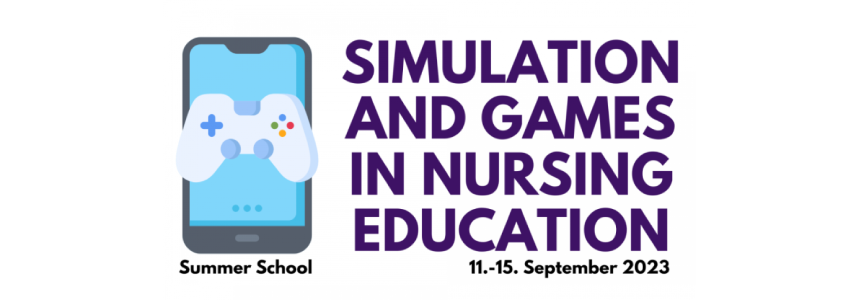SUMMER SCHOOLS
SIMULATION AND GAMES IN NURSING EDUCATION 2023

The summer school was organised as a Blended Intensive programme (BIP) with a physical and a virtual part.
Virtual part
The participants were asked to prepare a presentation about their institution, their country, and themselves before joining the MS Teams workshop.
After the welcome and short introductions of the summer school content and programme changes, every participant gave extensive reports with carefully prepared PowerPoint presentations characterising themselves as students and persons as well as illustrative describing their university, school, country, and health system.
After that, Madara Blumberga, Head of Simulation Education Development at the Latvian Rīga Stradiņš University gave an interactive lecture „Simulation as a Tool for Skills in Pediatric” and carried out an online simulation session. This session allowed participants to actively engage in hands-on learning experiences, using simulation as a powerful educational tool to simulate real-life pediatric scenario. During this lecture, she provided valuable insights into using simulation techniques to enhance pediatric skills.
Physical part
Summer School “Simulations and Games in Nursing Education” aimed to provide both domestic and international students with education in nursing through simulations that simulate real healthcare environments and through gamification that align with modern society’s expectations of future healthcare professionals.
The work was predominantly carried out in teams, where students tackled various healthcare challenges. The teams were awarded points daily for their performance, keeping it competitive and game-like. These points accumulated, and at the end of the programme, the best-performing team received a symbolic prize for their dedicated efforts throughout the summer school.
This summer school offered students excellent educational content and strived to make their stay in Maribor and Slovenia unforgettable. Students have also enjoyed in various social activities, providing opportunities for professional and interpersonal networking.
KIP methods and results
Fristly the students had the opportunity to listen to Sr Lect Taina Romppanen and Lect Sanni Vourinen‘s lecture from Kajaani University of Applied Sciences and DIGIHOI – DON’T LEAVE project. By breaking down geographical barriers, embracing technology, and reimagining the ways in which nursing education is delivered, this project is at the forefront of transforming the future of clinical competence training in nursing.
In the next activities, prepared by a dedicated team from UM FHS (Sr Lect Barbara Donik, Nino Fijačko, Assist Lucija Gosak, Sr Lect Barbara Kegl; Lect Petra Klanjšek and Assist Kasandra Musović), students engaged in various board games centred around different educational topics such as health maintenance, disease knowledge, and physiological changes. Additionally, students developed their research skills in the PICO question game, using cards to formulate different research questions.
In the “Scenario Resolution Using Advanced Technology” activity students used virtual reality to address scenarios based on both adult and pediatric populations. These scenarios guided them through disease management. Through virtual reality, students updated their knowledge in the emergency medicine field. Scenario resolution in a simulated environment with a high-fidelity simulation mannequin was carried out in teams, focusing on pediatric patients (e.g., difficulty breathing). After completing the scenarios, there was a debriefing session in a relaxed environment where lecturers reviewed the students’ performance in the simulations. This hands-on approach provided students with a unique opportunity to apply their knowledge and hone their pediatric skills in a controlled and safe environment, ultimately improving their preparedness and competence in pediatric care.
The Escape Room is a well-established approach within healthcare education. It imparts teamwork skills to students by challenging them to uncover clues that ultimately lead to the primary objective: successfully exiting the room. These health-related clues focused on topics such as sudden cardiac arrest and provided valuable educational content. Remarkably, four out of five groups demonstrated effective cooperation, enabling them to complete the escape challenge successfully.
The subsequent activity for summer school participants involved the creation of 3D infographics focused on healthcare subjects. These infographics illustrated frequently used healthcare materials and equipment, including items like venturi masks and endotracheal tubes. Through this undertaking, students acquired in-depth knowledge of the technical specifications associated with healthcare materials and equipment, a crucial aspect of their preparation for future professional roles.
Additionally, students had the opportunity to explore the snoezelen rooms at ZUDV Dornava, which are designed to create a serene atmosphere and feature calming equipment. These rooms are primarily utilised for individuals dealing with conditions like autism spectrum disorders, dementia, and developmental disorders. During their visit, students observed the execution of various activities and engaged in sensory experiences, which encompassed sound, visual elements, aromas, and other sensory stimuli.
One of the participating teams of students (from variuous countries) demonstrated the highest level of cooperation throughout the entire week and also accumulated the most points during the final presentations on the last day of the summer school.

